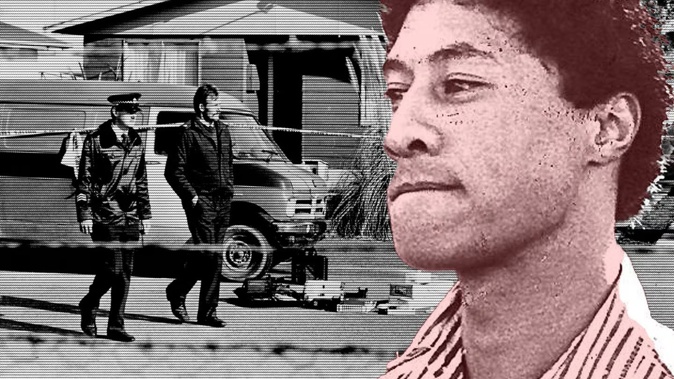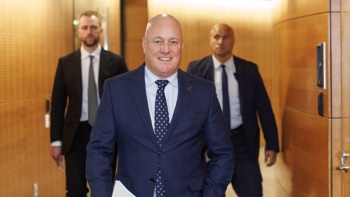

A mass murderer who killed seven of his family members, including his three young sons, has done a u-turn and admitted he intended to kill them - but still won’t say why he did it in the first place.
“I sort of changed my views as to what had happened back then,” Raymond Ratima told the Parole Board when he appeared before them today for the 15th time since he was jailed in 1993 following a murderous rampage in his hometown of Masterton.
“It actually happened how you described it… how my victims described it.”
The now 56-year-old killed his three sons Piripi, 7, Barney, 5, and Stacey, 2, in their grandparents’ home in 1992. He also killed his brother-in-law Philip Ferguson Junior, 14, his heavily-pregnant sister-in-law Nicola Ferguson, 20, her partner Bevan Tepu, 21, and their son Stephen, 3.
He then lay in wait in his in-laws’ darkened home in Judds Rd for his wife, Toni, and Phillip and Tubby Ferguson to return home, where he attacked his father-in-law with a softball bat.
But Ferguson stood his ground and fought back as the others rushed to neighbours and police were alerted.
Ratima was sentenced to life imprisonment with a non-parole period of 10 years after pleading guilty to seven counts of murder, attempted murder and killing an unborn child.
Since then, he has been denied parole 14 times, the last being in October 2022, which led him to take the board to the High Court last year where he accused them of bias.
/cloudfront-ap-southeast-2.images.arcpublishing.com/nzme/56NWHSXWXBFD3DYUHBKMYDYQR4.jpg)
Raymond Ratima was sentenced to life imprisonment in 1993 after pleading guilty to seven counts of murder, attempted murder and killing an unborn child. Photo / NZME
When he first became eligible for parole he claimed that he never intended to kill his relatives, but at this morning’s hearing he changed his story.
“I don’t know why I had a different view many years later and like I said it’s a very difficult topic to be speaking about before people I’ve never met before.”
Board chairman Sir Ron Young said the family members of Ratima’s victims were concerned that he had essentially reconstructed the narrative background leading up to the killings.
“…they take the view that your explanations as to the circumstances of the killing have changed and their view that’s very disappointing because they take the view you have not accepted responsibility,” Young said.
“We were concerned that you changed what you were saying, that you never intended to kill them, because that in your own mind would make that more acceptable to you.”
Young said the board had spoken to the victims’ family ahead of the hearing and they had steadfastly objected to Ratima being released from prison.
“They come back to us each time and say why? Why did he kill all these people?” Young said.
“There’s never been a kind of explanation they’ve felt they could understand.”
In response Ratima said his heart went out to all his victims.
/cloudfront-ap-southeast-2.images.arcpublishing.com/nzme/WX24FFV473VKHYEFSG2CST2KCA.jpg)
The scene of the Raymond Ratima mass murders. Photo / NZME
“I was a very selfish man for what I did… It’s really hard to explain the situation… and the actual time of the killings,” he said.
“All I can say is that I really regret full-heartedly [sic] the decision that I made in order to kill all those many children and adults.
“I hate myself for what I’ve done.”
“For them of course that doesn’t offer them what they’re looking for, but perhaps there is no answer,” Young replied.
Ratima has previously told the Parole Board in 2021 that he believed he was putting his children in a “better place.”
Psychological assessment
Ratima has met with various psychologists across some 100 appointments during his long stint in prison and he told the board that he found it hard to establish a rapport with any of them.
Reports from those psychologists recommend that Ratima be transferred to the Matapuna special treatment unit at Christchurch men’s prison which specialises in helping rehabilitate violent offenders.
However, Ratima sees moving there as a backwards step.
“I’m in a therapeutic environment at the moment,” he said, “I’m working out on the farm and with cattle and sheep and big machinery.”
“At the moment we’re calving and it’s a good learning experience for me.”
Ratima said that he earns $30 a week at the moment while at Matapuna he would earn less than half that.
Young questioned whether arguing against a transfer on the basis of pay was wise.
“Look at it from the perspective of the victims. What do you think they might think about that?” he asked.
“This is about my struggle and surviving financially in prison,” Ratima replied.
/cloudfront-ap-southeast-2.images.arcpublishing.com/nzme/DY4RMOEAY5D7ZP24VKODBPVETE.jpg)
Raymond Ratima - serving life for the murder of sevem people and an unborn child in Masterton, in June 1992.
“We understand that you’re settled and doing well where you are, but the whole purpose of the recommendations is to deliberately take you out of your comfort zone and to see how well you cope with different and challenging situations,” Young said.
“So if you just carry on where you then you won’t have those challenges.”
Panel member Julia Ioane asked Ratima if he understood what empathy was.
“I have absolute absolute empathy for my victims. I have put my feet in their shoes from day one of my crimes,” he replied.
“You say that empathy is about putting yourself in one’s shoes, but you said it was an emotional thing for you and you had avoided talking about it because bringing it up something 30 years later with a room full of strangers was difficult,” Ioane said.
“If you were to show empathy to victims’ whānau how do you think they would feel hearing that for you? That it was emotional and stressful for you?
“All they heard was you talking about yourself.”
“I could see how they would feel about that… they wouldn’t give a damn about how I felt,” Ratima responded.
“I realise I have taken a huge branch from both whānau’s whakapapa and it’s something I have to live with for the rest of my life.”
A woman Ratima has been in a relationship for the past eight years appeared as a support person at the hearing and said she’d been speaking to to him twice daily and visiting every fortnight.
“I totally understand where the victims are coming from, I do… on the other side of the coin I have come to love this man who was convicted of these crimes,” she said.
“I know Ray on a totally different level.
“I believe Ray deserves a chance to be reintegrated so he can maybe give back to that community.”
Ratima’s lawyer, Roger Eagles, told the board that he objected to his client being transferred to the Matapuna unit because it focused on rehabilitation rather than reintegration and he would simply be learning things he’s already covered.
Eagles also said that the board shouldn’t put a “glass ceiling” on Ratima gaining parole simply because of the number of victims.
“There’s no heightened test for Mr Ratima because of the number of victims in this case.”
Ratima was denied parole and will next appear before the board next year.
Jeremy Wilkinson is an Open Justice reporter based in Manawatū covering courts and justice issues with an interest in tribunals. He has been a journalist for nearly a decade and has worked for NZME since 2022.

Take your Radio, Podcasts and Music with you









